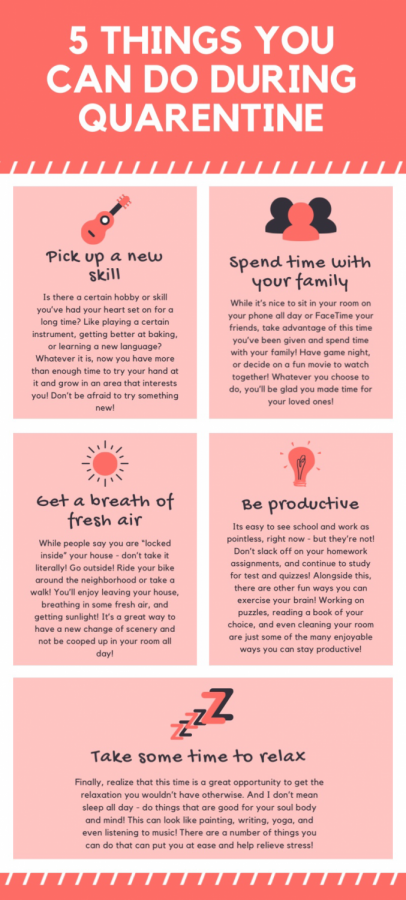So Much Sleep, So Little Time
The pandemic has created a new host of challenges including the surprising temporary insomnia many teens experience.
Although sleep is difficult during this time, there are many productive activities you can do
There are many reasons for the current pandemic to cause teens and adults alike to lose sleep. The first is just because the daily lives of everyone everywhere have been disrupted. The new schedule or even lack of a schedule is hard to adjust to. Keeping track of time can also be a challenge because people are missing the daily marks they are so used to such as the end of a school day, social events, or even going to the gym. Our bodies have muscle memory that tells us when it is time to eat and when to sleep during the day, but without these triggers, this gets all messed up. Not having that 6am wake up call for school or work makes staying up later and sleeping in longer sound like a good option, but this continued wack sleep sched- ule creates more issues than it can ever solve.
“Quarantine has messed up my schedule because I sometimes don’t even go to bed till 5 am and wake up at 10 am to be productive! Overall, I have the most weird sleeping schedule because it is different everyday,” said Jaela Ginger, senior.
Another reason that people are struggling to sleep is because of anxiety. It is a fearful time for everyone, and the uncertain- ty of the future can cause great amounts of stress and anxiety which can prevent sleep. Isolation can also contribute to the growing anxiety because of the lack of social communication with people outside the family. Especially for extroverts, who thrive within social situations and gain energy by being around people, this can be a very trying time.
“My sleep schedule is nonexistent right now. I usually go to bed around 4 or 5am and get up sometime in the afternoon,” said Alex Daiber, senior.
All of the extra time everyone has can cause them to turn to TV and screen time to fill their days. The excess exposure to blue- light can suppress the natural production of melatonin in our bodies, the chemical that tells us to go to sleep. It also stimulates the brain in ways that makes it hard to wind-down and get ready for sleep.
What makes it so much worse is that during the pandemic is when people need sleep the most. Sleep strengthens our immune systems and heightens our brain function. We think better, and we feel better after getting a good night’s sleep because it also improves mood and mental health.
There are some ways to get good sleep during these times. The most important thing is setting a schedule for yourself and sticking to it. Try to go to sleep and wake up around the same times and find a couple things you can do everyday that allows you to have a routine. For example, try to eat lunch around the same time everyday, maybe go for a walk every afternoon, or set aside time to talk to your friends. Another important thing to do is allow yourself time to wind-down before going to sleep. Set aside electronics and pick up a book or do some yoga. Give your body time to prepare for sleep without the distractions of a Netflix show or social media.
Stay active during the day. Don’t take a ton of naps or waste the day on the couch. Find things that keep you busy and make you excited. This is the perfect time to find a new hobby or to get back in shape. These are trying times and getting a good amount of sleep can help immensely with stress, especially when we finally transition back into our normal lives.




